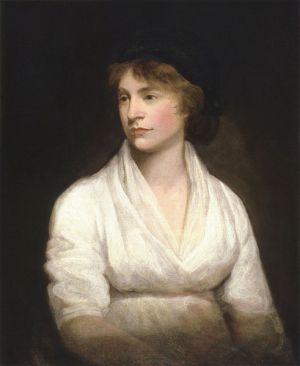Wikisage is op 1 na de grootste internet-encyclopedie in het Nederlands. Iedereen kan de hier verzamelde kennis gratis gebruiken, zonder storende advertenties. De Koninklijke Bibliotheek van Nederland heeft Wikisage in 2018 aangemerkt als digitaal erfgoed.
- Wilt u meehelpen om Wikisage te laten groeien? Maak dan een account aan. U bent van harte welkom. Zie: Portaal:Gebruikers.
- Bent u blij met Wikisage, of wilt u juist meer? Dan stellen we een bescheiden donatie om de kosten te bestrijden zeer op prijs. Zie: Portaal:Donaties.
Mary Wollstonecraft

Mary Wollstonecraft (Londen, 27 april 1759 – Londen, 10 september 1797) was een Engels schrijfster en feministe.
Na een onbaatzuchtige jeugd vol zorg voor diverse zieke familieleden en de dood van een goede vriendin (Fanny Blood), schreef zij, om de ouders van de laatste te ondersteunen, een kort geschrift, Thoughts on the Education of Daughters (1785), dat haar tien pond opleverde. Dit bracht haar op de gedachte meer te gaan schrijven om daarmee in haar levensonderhoud te voorzien.
Ze werd gouvernante voor de dochters van de Ierse burggraaf Lord Kingsborough en schreef Mary, a Fiction, grotendeels gebaseerd op de herinneringen aan haar overleden vriendin. Terug in Londen nam ze het schrijven serieus ter hand, wat leidde tot de publicatie van een kinderboekje, Original Stories from Real Life. Voor haar uitgever deed ze ook vertaalwerk en maakte bewerkingen, stelde een bloemlezing samen, en schreef artikelen voor zijn tijdschrift 'Analytical Review'. Het geld dat ze hiermee verdiende werd weer grotendeels besteed ter ondersteuning van haar vader, zusters en broers.
In 1789 werd ze gegrepen door de revolutionaire ontwikkelingen in Frankrijk en in 1792 vertrok ze naar Parijs om de Franse Revolutie van nabij mee te maken. Haar vertrek was wellicht tevens het gevolg van de vernedering die ze opliep toen de schilder Johann Heinrich Füssli haar voorstel om een driehoeksverhouding (hij was immers getrouwd) te beginnen afwees. In dat jaar schreef ze haar bekende feministische werk A Vindication of the Rights of Woman.
In Frankrijk ontmoette ze de Amerikaan Gilbert Imlay, van wie ze een dochter kreeg die ze Fanny noemde, naar haar vriendin. Na de pijnlijke breuk met Imlay probeerde ze zelfmoord te plegen. Dit mislukte en korte tijd later raakte ze bevriend met de radicale filosoof William Godwin, die romantiek en huwelijk afwees. Niettemin trouwde deze verklaarde tegenstander van het huwelijk in 1797 met de feministe. Ze benadrukten echter dat hun huwelijk geen concessie aan de heersende moraal was, maar dat ze volkomen gelijkwaardige partners waren.
Mary Wollstonecraft stierf op 10 september 1797, 11 dagen na de geboorte van haar dochter Mary, de latere vrouw van de dichter Shelley en auteur van de klassiek geworden roman Frankenstein.
Lijst van publicaties
- —.Thoughts on the Education of Daughters: With Reflections on Female Conduct, in the More Important Duties of Life. Londen: Joseph Johnson, 1787.
- —.Mary: A Fiction. Londen: Joseph Johnson, 1788.
- —.Original Stories from Real Life: With Conversations Calculated to Regulate the Affections and Form the Mind to Truth and Goodness. Londen: Joseph Johnson, 1788.
- Necker, Jacques. Of the Importance of Religious Opinions. Vertaling Mary Wollstonecraft. Londen: Joseph Johnson, 1788.
- —.The Female Reader: Or, Miscellaneous Pieces, in Prose and Verse; selected from the best writers, and disposed under proper heads; for the improvement of young women. By Mr. Cresswick, teacher of elocution [Mary Wollstonecraft]. Londen: Joseph Johnson, 1789.
- de Cambon, Maria Geertruida van de Werken. Young Grandison. A Series of Letters from Young Persons to Their Friends. Vertaling Mary Wollstonecraft. Londen: Joseph Johnson, 1790.
- Salzmann, Christian Gotthilf. Elements of Morality, for the Use of Children; with an introductory address to parents. Vertaling Mary Wollstonecraft. Londen: Joseph Johnson, 1790.
- —.A Vindication of the Rights of Men, in a Letter to the Right Honourable Edmund Burke. Londen: Joseph Johnson, 1790.
- —.A Vindication of the Rights of Woman with Strictures on Moral and Political Subjects. Londen: Joseph Johnson, 1792.
- —."On the Prevailing Opinion of a Sexual Character in Women, with Strictures on Dr. Gregory's Legacy to His Daughters". New Annual Register (1792): 457–466. [From Rights of Woman]
- —.An Historical and Moral View of the French Revolution; and the Effect It Has produced in Europe. Londen: Joseph Johnson, 1794.
- —.Letters Written during a Short Residence in Sweden, Norway, and Denmark. Londen: Joseph Johnson, 1796.
- —."On Poetry, and Our Relish for the Beauties of Nature". Monthly Magazine (April 1797).
- —. The Wrongs of Woman, or Maria. Posthumous Works of the Author of A Vindication of the Rights of Woman. Ed. William Godwin. Londen: Joseph Johnson, 1798. [postuum gepubliceerd; onafgewerkt]
- —."The Cave of Fancy". Posthumous Works of the Author of A Vindication of the Rights of Woman. Ed. William Godwin. Londen: Joseph Johnson, 1798. [postuum gepubliceerd]; fragment geschreven in 1787]
- —."Letter on the Present Character of the French Nation". Posthumous Works of the Author of A Vindication of the Rights of Woman. Ed. William Godwin. Londen: Joseph Johnson, 1798. [postuum gepubliceerd; geschreven in 1793]
- —."Fragment of Letters on the Management of Infants". Posthumous Works of the Author of A Vindication of the Rights of Woman. Ed. William Godwin. Londen: Joseph Johnson, 1798. [postuum gepubliceerd; onafgewerkt]
- —."Lessons". Posthumous Works of the Author of A Vindication of the Rights of Woman. Ed. William Godwin. Londen: Joseph Johnson, 1798. [postuum gepubliceerd;onafgewerkt]
- —."Hints". Posthumous Works of the Author of A Vindication of the Rights of Woman. Ed. William Godwin. Londen: Joseph Johnson, 1798. [postuum gepubliceerd]
- —.Contributions to the Analytical Review (1788–1797) [anoniem gepubliceerd]
